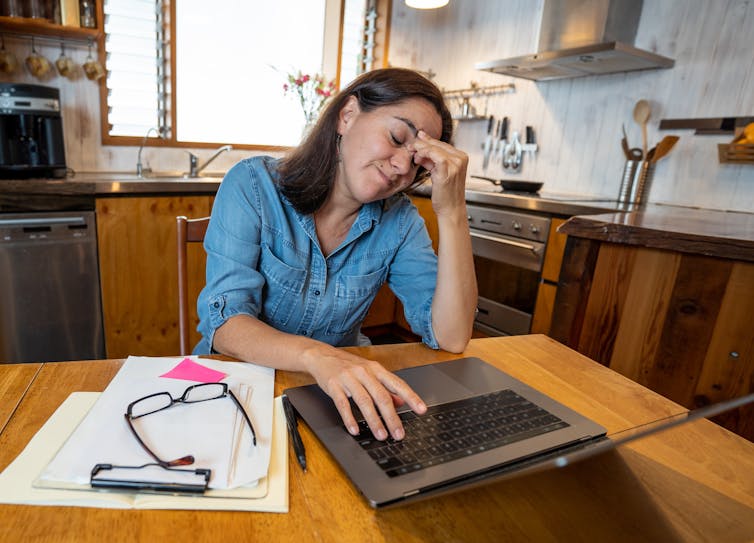
Sam Wordley via Shutterstock
Daniel Merino, The Conversation and Gemma Ware, The Conversation
In this episode of The Conversation Weekly, four experts dissect the impact a year of working from home has had on employees and the companies they work for – and what a more hybrid future might look like. And we talk to a researcher who asked people to sit in bathtubs full of ice-cold water to find out why some of us are able to stand the cold better than others.
For many people who can do their job from home, the pandemic meant a sudden shift from office-based to remote working. But after a year of working from home, some company bosses really don’t want it to become the new normal. The chief executive of Goldman Sachs, David Solomon, called it an “aberration”, and Barclays chief executive Jes Staley said it wasn’t sustainable, because of how hard it is to maintain culture and collaboration with teams working remotely.
Meanwhile, others are fully embracing a remote work future. Twitter said its employees could work from home forever, and Spotify announced a “work from anywhere” policy. Other firms are starting to announce more hybrid policies, where people are expected to split their week between the home and the office: in March, BP told employees they would be expected to work from home two days a week.
In this episode, we talk to researchers who have been studying the shift to remote working during the pandemic about their findings. In France, Marie-Colombe Afota, assistant professor in leadership, IÉSEG School of Management in France, talks us through the initial results of a new study she did in late 2020 of 4,000 employees at a large French multinational. “The more employees felt that the organisation generally values being visible in the office, the more they felt expected to be constantly available while in remote work,” says Afota. “And, in turn, two months later, the less they felt productive and happy in remote work.”
A year of working from home has left some people close to burnout, according to Dave Cook, a PhD researcher in anthropology at University College London who has been interviewing people about their experiences of shifting to remote work during the pandemic. “Burnout and work-life balance is the forgotten public health emergency that’s emerging through throughout this lockdown,” he tells us. And he says that companies should start communicating with their staff now about what the future has in store: “So their employees can get on with planning the rest of their lives.”
For others, the shift to remote work has been a surprisingly good experience. Jean-Nicolas Reyt, an assistant professor at McGill University in Montreal, has been tracking the language that chief executives in North America used to talk about remote working in 2020. “What you see is that actually that misconception, that telework is just not as efficient as co-located work, has vanished for a lot of CEOs,” he tells us. “A lot of CEOs and a lot of employees are saying it was forced, but it’s actually pretty good.”
Ruchi Sinha, a senior lecturer in organisational behaviour and management at the University of South Australia, gives the view from Australia, where hybrid working is already becoming a reality, and where most invitations to a face-to-face meeting now come with a video link too. But Sinha says that opportunities to shift to a fully flexible way of working may be being missed, with companies implementing new policies as rigid as the old ones. “I don’t think we are spending enough time thinking about are we giving people choice to shape their jobs, to shape what they do,” she tells us.
In our second story, we find out that your genes influence how resistant you are to cold temperatures. To test this, scientists asked a group of men to sit in bathtubs full of icy water to measure their reaction – and how much they shivered. Victoria Wyckelsma, a postdoctoral research fellow in muscle physiology at the Karolinska Institutet in Sweden, explains what they found and what it means.
And Sunanda Creagh from The Conversation in Australia gives us some recommended reading about the recent floods in Sydney.
Read more:
‘They lost our receipts three times’: how getting an insurance payout can be a full-time job
The Conversation Weekly is produced by Mend Mariwany and Gemma Ware, with sound design by Eloise Stevens. Our theme music is by Neeta Sarl. You can find us on Twitter @TC_Audio or on Instagram at theconversationdotcom. We’d love to hear what you think of the show too. You can email us on podcast@theconversation.com
A transcript of this episode is available here.
News clips in this episode are from CNN, CNBC News, CBC News, NBC News, Arirang News, World Economic Forum, Goldman Sachs, AlJazeera English, 7 News Australia, Sky News Australia,, Euronews, DW News and Jornal da Record.
You can listen to The Conversation Weekly via any of the apps listed above, our RSS feed, or find out how else to listen here.![]()
Daniel Merino, Assistant Editor: Science, Health, Environment; Co-Host: The Conversation Weekly Podcast, The Conversation and Gemma Ware, Editor and Co-Host, The Conversation Weekly Podcast, The Conversation
This article is republished from The Conversation under a Creative Commons license. Read the original article.

